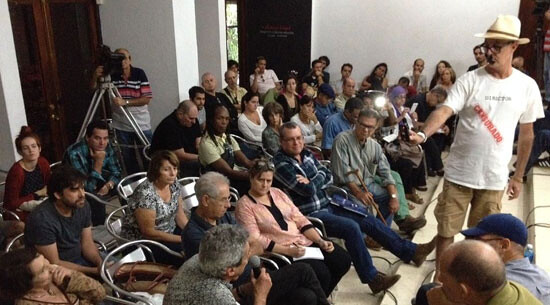During the past fifty-six years, censorship in Cuba of works of art and the cultural practitioners who produce them—justified as a defense of the Revolution—has paradoxically resulted in a boomerang effect against the political prestige of the revolutionary process. From the beginning, that revolutionary process encouraged and developed the artistic expressions that underpin and reinforce our national identity, ensuring the continuity of the positive legacy of this time in our history. If we were to tally up the rectifications and retrievals of works and cultural figures once stigmatized and branded as counterrevolutionary (which led to their being condemned to political ostracism) by leaders and officials of a rigid and dogmatic orthodoxy—an effort that has occasionally been interrupted by corrupt, opportunistic, or simply inconvenient actions within the vertical power structure—the list would be a long one. Today, the injustices committed during the so-called Gray Five Year Period are officially recognized, and any making of amends, reparations, and appropriations of their legacy has taken place for the most part only after the authors have already died or have emigrated.1 But for those who had to leave because their works criticized, exposed, and denounced the intolerant, authoritarian tendencies of the bureaucratic system, to be “rescued” meant you were already dead.


Criticism is a means of understanding the truth, and it is inherent to any artistic endeavor that explores, investigates, and scrutinizes human conflicts in social, political, and economic terms both historically and in their current reality. And being intolerant of criticism has been and continues to be a symptom of fear in confronting the responsibilities of a bureaucratized power structure that has made mistakes, committed excesses, and deviated from its original revolutionary and liberal impulses. There were mistakes and foolish remarks motivated at some times by impatience and good intentions, and at others by willful blindness in a sea of chimerical stagnation; an inability to adapt and restructure the utopia in accordance with the pressing requirements of a reality in need of an objective, sensible, and balanced assessment of the causes of its flaws and shortcomings so as to correct them. Instead, and despite the recurring calls for rectification and public critique of how badly things have been done over these past fifty-six years, the attention is always directed at the phenomena rather than the causes.
The absence of systematic critique in informed media, which is itself subjected to castrating censorship, has forged the sacred, untouchable nature of the vertical decisions made by power. Attempts to mask this are made through participatory consultations during which the “makeup” is retouched and reapplied. There is a sense of stagnation in public awareness and an ideological exhaustion regarding the worn-out, propagandistic character of a state media that turns its back on the reality of a dull and lifeless future, provoking an apathy and escapism for those who are worried about ideological diversionism, and the superficiality and banality of the entertainment consumed in “paquetes,” i.e., computer games, reggaeton music, and so forth.2 This loss of values—the rudeness, vulgarity, the lack of discipline in public behavior—is also the result of not having nurtured and promoted independent judgment and healthy rebelliousness as part of civic education, as Che Guevara encouraged us to use against all liars and opportunists who tout their dictates of discretion, caution, and restraint in our nonconforming citizens’ forms of expression. There are legitimate disagreements regarding the civil right to express an opinion without it being repressed by fear of the consequences of a critical viewpoint appearing “in the wrong place, at the wrong time, and in a politically incorrect manner.”
Many works of film, theater, and visual arts have contributed to confronting us with this wall of silence that is protected by the ideological gatekeepers who censor and condemn those same works in the name of the Revolution, when in fact those gatekeepers are undermining the pillars of humanism in our society. Movies, plays, sculptures, and paintings—not to mention the period of prohibition suffered by the best exponents of the Nueva Trova movement in Cuban music, who ultimately became the most authentic voices of the Revolution—have suffered the brunt of this reactionary hangover that shuns the debate of ideas.
Contradicting the appeal submitted to the highest levels of government to take on reality with a critical, honest, and ethical commitment, recognizing that a unanimity of opinion is just a simulation, the authorities recently launched a series of attacks on a writer whose literary and journalistic work is an example of seriousness and sincerity in recognizing our current material and spiritual needs. In addition, he is a genuine exponent of what it means to be a committed and authentic Cuban. I’m speaking, of course, of Leonardo Padura, and I’m referring to the foolish banning of the film inspired by his novel, Return to Ithaca, during the Havana Film Festival. Several months later it would be screened during French Cinema Week, though that was hardly an admission of an arrogant prior mistake. The banning was foolish because it shamelessly exposed the fangs of the crouching, dogmatic beast, and discredited not only the ban itself but also the power it represents. Clearly this intolerant behavior demonstrates not strength but weakness, a disease in the intellectual and political bones of one who cannot engage in an open and responsible debate with reasoned arguments that would contribute to a climate of trust in which to seek solutions to the problems that artists point to in their works. Or that would prevent us from continuing to repeat the sad story of encouraging a form of “revolutionary” combativeness prone to muzzling thoughts and converting reasonable caution into the sickly paranoia being produced in our country. A change in health comes not just with the intention to have everything remain the same, but really by taking aim at eliminating this inability to look at ourselves in a disconcerting mirror, to acknowledge our imperfections, and to question the historical, systemic deficiencies in the structure that encourages them.


And with that, I finally arrive at the original reason for writing these words: the banning of a play directed by Juan Carlos Cremata and the suspension of his work as a theater director. I recall when Cuban theater reached the heights of its splendor at the time of the triumph of the Revolution, only to then suffer that purge, known as the “parametrization,” whose aberrant and repressive prejudices resulted in frustration, ostracism, and exile for artists who were enriching our cultural heritage with their art.3 I don’t think I’ll tell the entire story or mention those who were crushed by that purge, which I see as truly shameful and counterrevolutionary, and which only brought discredit upon the Revolution. Certain extremist decision-makers interpreted the aspirations of creating a New Man as being equivalent to forming obedient, dogmatic robots filled with reactionary prejudices, and while they may be embattled today, they have not been exterminated. Nor will I pause to argue about the play in question, with which one can agree or disagree, and which you can choose to enjoy or not.
I would simply like to point out that I consider it inappropriate for some—who are not artists themselves and who have contributed nothing to the national culture—to once again set themselves up as judicial inquisitors who, having hitched themselves to an ephemeral authority, decide to frustrate the career of an artist, a creator whose work in film and theater is part of our own cultural heritage. There may be disagreements, and at any time a theater director can decide whether or not to stage a work, whether or not to suspend or continue a production, but the anomaly here is this: If there was prior supervision with regard to its content and staging, why should censors be involved if a situation arises after the work’s premiere? In Cuba, the theater is sponsored by the Ministry of Culture, and it responds to a cultural policy whose range should be as broad as its understanding of the discerning abilities of a national audience whose educational, political, and cultural levels are officially recognized. So, why censor the adaptation and staging of a play that, in and of itself, is highly provocative and thus perfectly compatible with the function of a work of art that aims to break down taboos, to move us, to call us to think, to take sides either for or against what it proposes? Do we or do we not have an educated public committed to the ideas and principles of the Revolution, one able to draw its own conclusions on whether to accept or reject it? What truly constructive sense is there in exclusionary censorship, other than to control the debate between those who perform the artistic activity and those who are potentially subjected to that same arbitrariness?


Twenty-five years ago, when censures were issued against Daniel Díaz Torres’s film Alice in Wondertown, and instructions were issued for Party militants to attend the Yara Cinema screening one block away to “quell any counterrevolutionary expressions,” an official notice appeared on the front page of Granma, the official newspaper of the island’s Communist Party, announcing a decree by the State Council to place the Cuban Institute of Cinematographic Art and Industry under the supervision of the Cuban Institute of Radio and Television. This meant that the national film institute lost its relative autonomy in making political decisions about the films it produced. The ICAIC’s relative autonomy had until then, made possible the release of a series of movies and documentaries which today could be seen as diagnostic of the ills that only worsened during the so-called Special Period in Time of Peace, to the point of sounding the alarm for the urgent need for the changes we enjoy today. At that time, the filmmakers got together to protest the ruling that disqualified the film and its director and dissolved the Cuban Institute of Cinematographic Art and Industry. The film itself was not counterrevolutionary, nor were the director or any of us who readied ourselves in defense of that artistic space with critical proposals, all of which were aimed against reductive, authoritarian, bureaucratic controls exactly like that which caused the desmerengamiento of the Socialist Block.4 Directors like Santiago Alvarez and Tomás Gutiérrez Alea, among others, endorsed this critical trajectory through their own work, a trajectory that always faced harassment and repudiation by the guardians of the pristine and uncontaminated chalice of an ideology with no supreme saviors, no Caesars, no bourgeois, no God. Today it might be seen as a bit controversial, that endorsement of the practical application of dialectics. And, thanks to this resistance from his peers, he was able to continue a kind of filmmaking that never turned its back on reality and which, to this very day, maintains its rebellion against bureaucratic ukases and diktats.5
That spirit of rebellion is also manifest in our protest against the attempt to exclude us from making decisions regarding the proposed restructuring of the Cuban Institute of Cinematographic Art and Industry6 and our insistence that a law be enacted guaranteeing the recognition of independent production and of a film institute to promote and protect the national cinema instead of monopolizing and controlling it, because that’s all we have. That effort has gone on for two years.
The Cremata case falls within the ideological debate that has defined the destiny of a process that needs to maintain the historical memory of its reason for being alive in order to stop committing the same mistakes that harm our valuable cultural treasures. It is a critical thermometer that no amount of censorship can completely shut off as long as we are able to act in accordance with our civic duty.
The Gray Five Year Period refers to the period between 1971–76 in Cuba when cultural affairs were administered directly by the Communist Party. Many luminaries of Cuban literature and the arts were relegated to internal exile, unable to publish, work in their fields, travel, or present themselves in public.
“Paquetes” (literally “packages”) refers to flash drives filled with pirated foreign television shows and movies, computer games, popular music, and print media that are sold illegally throughout Cuba. A paquete costs 2CUC ($2.50). Cuban state officials frequently speak out against them as crass and immoral, but their widespread popularity has contributed to a decline the in viewing of state media.
The “parametración” refers to laws and actions taken in the early 1970s in Cuba that essentially criminalized homosexuality and forms of behavior considered antisocialist. Following a 1971 speech by Fidel Castro in which he suggested that artistic and intellectual circles gave homosexuals dangerous opportunities to influence Cuban youth, laws went into effect that led to the expulsion of scores of artists, professors, teachers, and other professionals from their jobs.
“Desmerengamiento” is a term coined by Fidel Castro to refer to the collapse—or desmoronamiento—of the Soviet Union. It stems from the word “meringue” and, as with a failed meringue, it implies collapse, for it was the same hammer and sickle that broke down the Berlin Wall. In other words, it went to the disbelief and dysfunctionality of the Soviet model, in which lay—worn out and worm-eaten—the revolutionary essence of its origins.
“Ukas” is Russian for edict. “Diktat” is an order or decree imposed without popular consent.
There is the official claim to legitimize institutions eroded by a future that has exceeded its capacity for functional rehabilitation in order to respond to new demands imposed by a present quite distinct from that which motivated its origins. See the documentary Que me pongan en la lista …
Category
Subject
Translated by Ezra E. Fitz.
